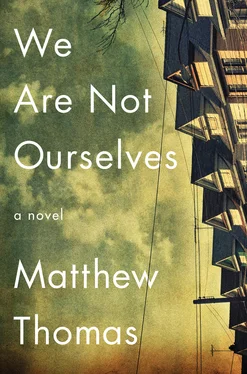He went through the list of colleges he and his mother had come up with together: Harvard, Yale, Princeton, Columbia, Penn, Williams, Amherst, Johns Hopkins, and Georgetown, along with a couple of local safeties, Drew and Fordham. Every school on the list was less than five hours away. He decided he wouldn’t apply to any of them except the safeties. He made a new list: Chicago, Northwestern, Notre Dame, Stanford, Rice. Nothing small or that she hadn’t heard of or whose virtues he’d have to explain. Nothing, in short, that she wouldn’t pay for. He was going to force her hand. She’d never let him go to either of the safeties if he got into one of the better, farther-flung schools, even if the safety gave him scholarship money, which there was a chance they would: he had the grades, the SAT scores, and he had finished third in the state in Lincoln-Douglas debate. She would rather pay full freight and put a Notre Dame sticker on the car. She had explained how she was going to pay for his schooling: something about borrowing against the equity they had in the house and taking out private loans. All he knew was she’d told him she was going to make it so that he wouldn’t have to worry about paying the loans back. And if it didn’t work out, he would put the Drew sticker on the car himself — because what right did she have to be disappointed in him for going to Drew, when she’d only gone to St. John’s?
He felt like he could see the whole world, clearly, all at once. He was going to leave everything behind. He was about to be born again, but this time complete with all the defenses he would ever need. He would invent the world as he went along. He would pass through a thousand years in the blink of an eye.
Connell ran to catch the last train out of Grand Central, the one-thirty, but it was pulling out as he arrived at the platform. He sighed and kicked the big metal newspaper recycling bin. He had already seen that when you lived in the suburbs and you missed the last train, you entered a netherworld, a night town. It was going to be a long time until the five-thirty train.
He decided not to call to say he’d missed the train, even though his mother had told him to call no matter how late if he wasn’t coming home, because he felt too guilty to hear her voice. He had left that morning and hadn’t checked in all day. There wasn’t room in his mother’s overtaxed mind for her to enforce curfews and restrictions. She just counted on him not to get into trouble. He kept up his end of the deal, but he knew she wished he were around more. She had grown accustomed to his coming home late, but she hadn’t stopped feeling hurt by it. When he came in at half past two, after walking a silent path from the station, he sometimes heard her call to him quietly as he passed his parents’ room at the top of the stairs. Lately, though, she had learned to sleep through the night. Tonight he was going to take his chances that he’d get in before she awoke in the morning. It was easier to avoid conflict of any sort.
He walked across Forty-Second to the B, to head down to West Fourth. A girl he’d briefly dated had told him about a place on West Tenth called Smalls, where she’d stayed literally all night once. They let underaged kids stay as long as they didn’t try to order alcohol. It was a jazz club. He didn’t know anything about jazz, but it was better than sitting in a diner and having to fight to stay at a table.
He handed over the cover charge. The place wasn’t full. He sat at an empty table near the stage, under the lights, and ordered a Coke. The set was a mellow trumpet backed by drums, a piano, and a sax.
Faces in the crowd smiled warmly at him. The waitress didn’t seem to mind that he wasn’t running up a bigger tab. When the trumpeter finished blowing a solo, the audience drizzled him with applause — a comforting pitter-patter, like a summer shower glancing off an air conditioner.
The crowd could have been anyone. He decided they were important people, decision makers. He imagined they were pleased to see a young person in their midst — that they endowed him in their minds with maturity and grace. He tried to look as keen as he could, though he didn’t understand the music. He performed the arousal of a true aficionado, twisting his face in agonized appreciation of a long-held note.
As the set wound down, the crowd dwindled. The performers seemed to relax. They nodded to people seated near him, spoke to a few. They took more time between numbers. He sensed that a different jazz was being cooked up, one that needed to marinate longer.
As four o’clock approached, people spread out on banquettes behind him. The players on the stage changed. His Coke glass kept getting refilled. The night felt full of possibility. Time was on his side; he could be anything he wanted.
His family, asleep at home, seemed a world away. He was ready to commit himself to the strivers, the lovers of life — these would be his new guides.
At five, the waitress began bringing out some trays of food. She left them on a long table by the front entrance. He watched a couple of people head over to them.
“Is this for us?” he asked the waitress.
“It’s for whoever.”
He’d never seen anything like it. First they let him stay all night. Now they were feeding him breakfast. It wasn’t anything special, but it was so strange and unexpected that it felt like a feast to him.
He piled his plate with rolls and butter, spooned out some eggs, and filled his cup with orange juice, looking forward to the little ritual of ceding his place in line, the brief exchange of shared enthusiasm, but the guy behind him just grabbed a roll and sat back down, and no one else followed. Connell hovered awkwardly, pretending to contemplate the spread, until he got self-conscious and walked back to his seat with his head down and ate a lonely meal.
• • •
When he walked in at seven, his mother was asleep at the kitchen table. Tins were piled up on the island; powdered sugar dotted the floor. He and his mother were supposed to have made Christmas cookies together that night. It was a little tradition they had. He’d gone out with his friends in the afternoon and never come home, so he’d forgotten all about it.
He counted the tins; she’d made as many as always. He lifted the wax paper in one and saw some cookies missing sprinkles, some misshapen ones.
She was hunched over the table, her head in her folded arms, looking as if her back would ache in the morning.
He shook her lightly. “Ma,” he said. “Go upstairs. Go to bed.”
It took a moment to rouse her. She rose slowly and began to head for the stairs. She stopped in the doorway, turned.
“I will never wait up for you again,” she said calmly, and his heart stopped for a moment. “I will never worry when you don’t call. I will never again worry about you. I promise. You are free.”
• • •
Connell drifted into his parents’ bathroom, the smell of Swedish meatballs giving way to lavender soap. It was Christmas Eve. The radio in the bedroom was tuned to the same Christmas station as the radio downstairs, as though his mother couldn’t be away from “Rockin’ Around the Christmas Tree” for long enough to change her clothes.
His father had applied the shaving cream in a grotesquely liberal dose. He picked up a blue plastic razor, one of those bulk-pack, single-blade jobs he insisted on using and with which even a dexterous man could injure himself. Connell watched him raise the torture implement to his face and begin to make groping stabs at his jaw. He had to leave before the carnage began.
He went downstairs. His mother was checking on the turkey in the oven.
“Your father has informed me that he doesn’t like Christmas, that he never has, that I go overboard, that things are out of control.” She doused the bird with a baster and the juice that escaped from the tray sizzled on the bottom of the oven in loud hisses. “Do things seem out of control to you?”
Читать дальше
Конец ознакомительного отрывка
Купить книгу












